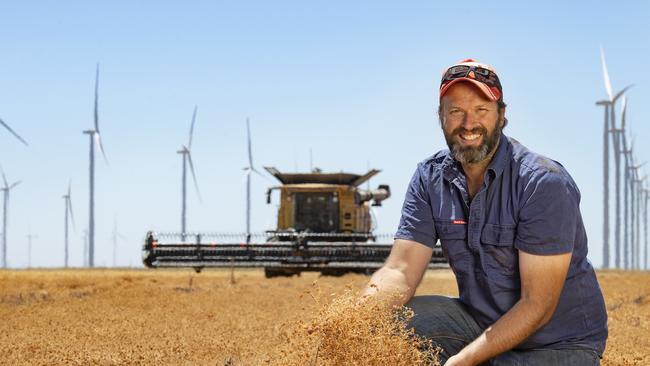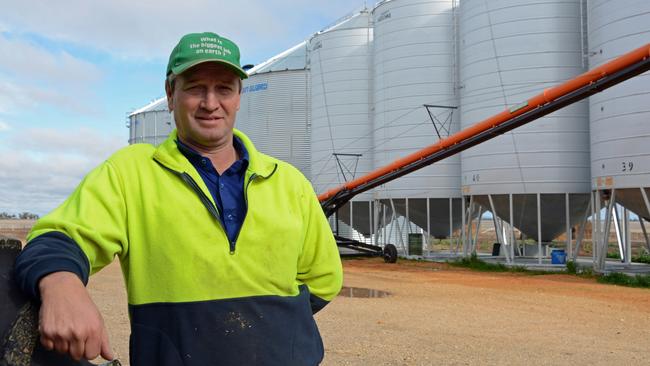EU readies to introduce new chemical bans on imported food
Australian farmers risk getting caught up in Europe’s tougher import rules relating to chemical use and animal welfare.
Australian farmers are on alert with the European Union poised to impose sweeping new bans on imported food products as it lays the groundwork “to ensure a fair and level playing field” for EU farmers.
In a new five-year road map due to be released on Wednesday, the EU Commission’s Vision for Agriculture and Food is believed to include a stronger alignment of production standards to imported food.
The measure would target “the most hazardous pesticides” already banned in the EU for health and environmental reasons, as well as animal welfare practices.
National Farmers’ Federation president David Jochinke said the EU was a key market for Australian agricultural products and he was “extremely concerned about any attempt to impose prescriptive, one-size-fits-all regimes on trading partners”.
“Australia has a fundamentally different production environment to the EU - we require agvet chemicals to produce food and fibre sustainably,” he said.
Mr Jochinke called on the federal government to protect the interests of Australian farmers.
Chemicals banned in the EU but still used in Australia include paraquat, which is currently up for review with the chemical regulator; diazinon (products with diazinon can be used until September); and fipronil, which is also under review, among others.

Farmer organisations are carefully monitoring the EU situation as well as moves by United States president Donald Trump over potential tariffs, as global trading enters a new era.
Victorian Farmers Federation president Brett Hosking said the EU should respect the differences in European and Australian farming systems, and that different inputs were required, including chemicals.
“Just because a country is ideologically opposed to the use of a chemical does not make it unsafe,” Mr Hosking said.
“We are seeing more and more non-tariff trade barriers around the world and Australia, as an exporter, we believe in free and open trade.”
Mr Hosking said the APVMA’s paraquat review was an example of how Australia made regular assessments on the chemicals it used in agricultural production.
“It is in everyone’s interests to make sure that what we use is safe in our food systems,” Mr Hosking said.
Last year Australia exported $2.3bn worth of grains and oilseeds to the EU, $181.9m worth of beef and veal and $48.6m worth of sheep meat.
Residue monitoring by the Department of Agriculture, Fisheries and Forestry in 2023-24 showed one sample of barley from 424 tested breached the minimum residue levels for paraquat, while there were no issues with wheat and canola.
Agricultural commodity analyst Andrew Whitelaw, of Episode 3, said the EU was a leader in environmental regulation.
“Other countries tend to look at the EU and follow suit … and it’s not a far cry to say glyphosate will be next,” Mr Whitelaw said.
“This is another sign of political aspirations going beyond what is actually practical. We’re living in a time when there’s a lot of policy changes coming in that are not for farmers. “Robert F. Kennedy is in a position of power in the US and is also looking to ban chemicals.”
Cattle Australia chief executive Dr Chris Parker said the EU was a small but high-value market for Australian beef.
“Promoting free trade and market access is a fundamental issue for Cattle Australia, and any initiative that could be perceived as a new form of trade barrier is something that we will examine closely,” Dr Parker said.

Grain Producers Australia southern grower director Andrew Weidemann said Australia had longstanding concerns about the EU’s unscientific approach to market access matters.
“There are pernicious impacts for local grain production – due to objective scientific analysis and evidence being disregarded and prioritised over politics and ideology,” Mr Weidemann said.
GPA has worked with its members on the critical role herbicides such as paraquat played in modern sustainable crop production, he said, providing feedback to the APVMA in its current review of the chemical.
Australia would be most exposed to an EU ban on paraquat though its canola exports. The EU imports the majority of its canola from Australia and the Black Sea.
However the bulk of Australia’s canola exports – about 75 per cent based on 2022 data – are sent to the EU for its biodiesel market, which may shield its impact on Australian growers.
Demand for low-emissions canola oil rose in 2009 when the EU issued a directive that at least 10 per cent of its transport fuels had to be sourced from renewable materials.
Professor Peter Draper, executive director of the University of Adelaide’s Institute of International Trade, said the EU’s tightening on environmental regulations had been a long time in the making, rather than a mimicking of Trump’s style of tit-for tat diplomacy in response to the US’s threats of global tariffs, and would have wider implications for Australia’s global trade.
Australia exports about two thirds of its agricultural production to more than 160 countries.
“There’s a well-known effect, called the Brussels Effect. They set rules for themselves, EU corporations then apply them in their global operations, thereby externalising EU operations,” Dr Draper said.
“Take the Carbon Border Adjustment Mechanism. We all complained about it, but now we’re all copying it. When it comes to the environment, it has been a core focus of the EU.”
A DAFF spokeswoman said the federal government was monitoring announcements from the EU and was in regular discussions with EU regulatory bodies about pesticide use and allowable residues for imported products.
“The Australian Government continues to advocate for maintained and broadened market access for Australia’s safe and high-quality agricultural products, based on our robust regulatory controls for pesticide use and residue levels,” she said.




